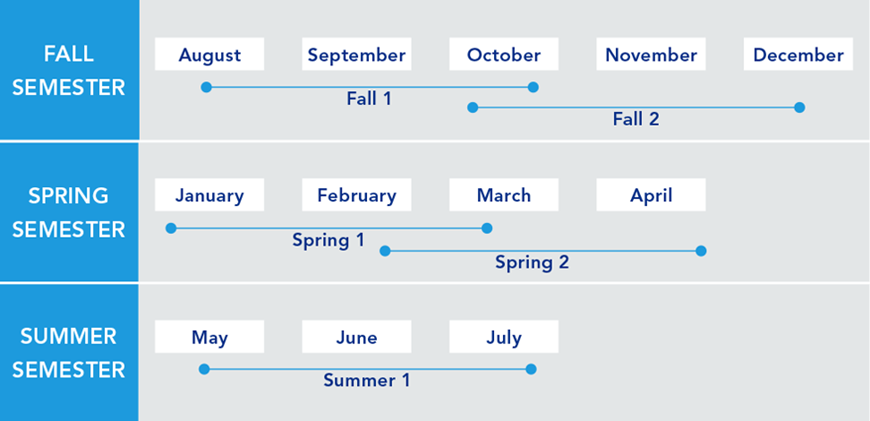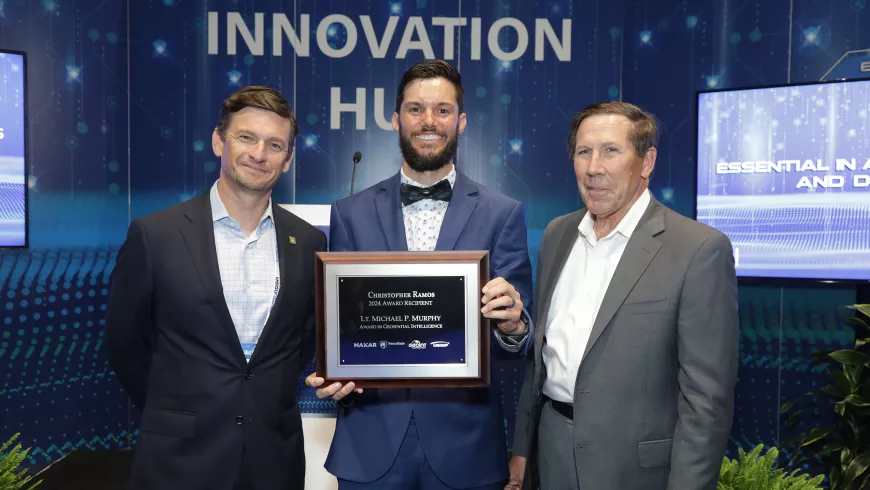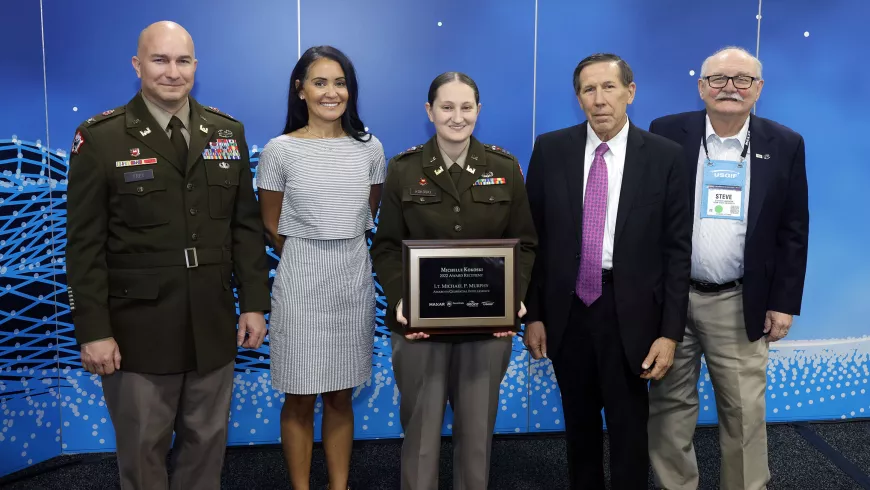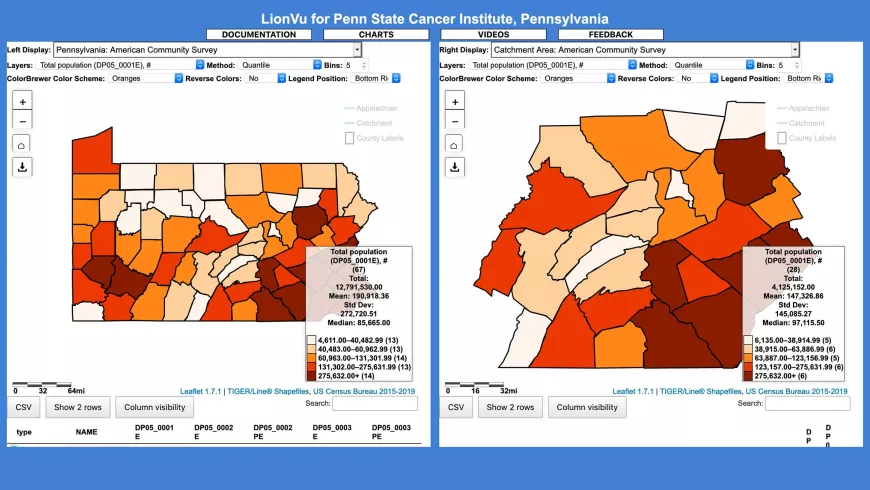100% Online
Complete your Penn State course work at your own pace and 100% online.
Application deadline
Credits and costs
10-Week Terms
Finish your program faster with accelerated 10-week terms.
Gain Marketable Skills to Work at the Forefront of the Geospatial Industry
Customize GIS software to extend its built-in functionality and automate repetitive tasks.
Leverage geospatial analysis tools and modeling to develop new workflows to solve problems that impact people and our planet.
Architect and implement new web and mobile GIS applications that blend computational and visual approaches.
Research, communicate, and critique data quality and the results of spatial analyses.
Online Spatial Data Science Courses
Online Spatial Data Science Courses
While some degree programs target users of GIS applications, this next-generation degree focuses on developing the creators who will push the boundaries of industry and science by redefining the power of location-based data. In this program, you can:
- strengthen your programming knowledge and higher-order thinking skills
- learn how to solve complex problems that require more than off-the-shelf solutions
- gain experience applying spatial data science and technology in at least two application domains, such as public health, emergency management, and business analytics
- learn to leverage spatial data to develop insights and improve decision-making
Our pragmatic approach ensures you develop a relevant skill set that you can put to work immediately. The program is structured into four distinct areas of study:
- Required courses (15 credits)
- Spatial data science methods electives (9 credits)
- Spatial data science application electives (6 credits)
- Scholarly paper or research thesis (3 or 6 credits)
A minimum of 33 credits at the 400, 500, 600, or 800 level is required. At least 18 credits must be in 500- or 600-level courses.
Program Engagement
Your education will blend self-study with peer-to-peer interaction over an online learning network. You'll complete weekly assignments, readings, discussions, and occasional group work, as well as projects and other activities designed to enhance your learning outcomes, all at times that are most convenient for you. Every class is designed as a partnership between expert faculty and learning designers for optimal online delivery; courses are not just recorded lectures.
Required Courses (15 credits)
- 3credits
Customizing GIS software to extend its built-in functionality and to automate repetitive tasks.
- Prerequisite
GEOG 484 or permission of the program
- 3credits
Theory and practice of cartographic design, emphasizing effective visual thinking and visual communication with geographic information systems. Technologies: ArcGIS Pro, Mapbox Studio, QGIS
- Prerequisite
GEOG 484 or permission of the program
- 3credits
Focuses on the science of analytical reasoning mediated through human-centered interactive geographic visualization and computational methods; provides students with hands-on experience solving complex problems through the design, implementation, and application of geovisual analytics tools.
- 3credits
Systematic approach to requirements acquisition, specification, design, and implementation of geospatial information systems.
- Prerequisite
GEOG 484 or permission of the program
- 3credits
Choosing and applying analytical methods for geospatial data, including point pattern analysis, interpolation, surface analysis, overlay analysis, and spatial autocorrelation.
- Prerequisite
GEOG 485 or GEOG 486 or GEOG 487
Spatial Data Science Methods Electives (select 9 credits)
- 3credits
Using imagery and terrain data in typical application scenarios faced by the geospatial professional.
- 3credits
Understanding lidar systems; design, operation, data processing techniques, and product generation to address typical application scenarios faced by the geospatial professional.
- 3credits
Case studies, student investigations, and projects reveal the scope, impact, and character of the Geospatial Revolution.
- 3credits
How geographic information systems facilitate data analysis and communication to address common geographic problems.
- Prerequisite
GEOG 482 or permission of the program
- 3credits
Database design, creation, maintenance, and data integration using desktop GIS software.
- Prerequisite
GEOG 483 or permission of the program
- 3credits
Learn advanced applications of Python for developing and customizing GIS software, designing user interfaces, and solving complex geoprocessing tasks using both proprietary and open source platforms. Technologies: ArcGIS Pro, ArcPy, Jupyter Notebooks, ArcGIS API for Python, QGIS, GDAL/OGR.
- Prerequisite
GEOG 485 or permission of the program
- 3credits
Design, development, and implementation of web mapping applications using OGC standards and open source software. Technologies: JavaScript, QGIS, GDAL, OGR, GeoServer, TileMill, Leaflet, and OpenStreetMap
- Prerequisite
GEOG 485
- 3credits
Advanced topics in remote sensing and image processing, including new sensors, applications, and decision-making.
- 3credits
Explores three important topics related to georeferenced data: datums, map projections, and grid systems.
- Prerequisite
GEOG 483 or permission of the program
- 3credits
Focuses on how geospatial professionals can create applications using industry-related geospatial APIs. Students will build applications using the core web technologies of HTML, CSS, and JavaScript. Technologies: JavaScript, ArcGIS API for JavaScript, ArcGIS Online, CSS
- 3credits
Theory and practical applications of using cloud computing and server resources to solve geospatial problems. Technologies: ArcGIS Server, Portal for ArcGIS, ArcGIS Online, GeoServer, CARTO, Amazon Web Services, Mapbox, Google Fusion Tables Theory.
- Prerequisite
GEOG 484 or permission of the program
- 3credits
Advanced topics in the storage, management, and retrieval of geospatial data using common proprietary and open-source relational database technologies. Technologies: SQL, PostGIS, ArcSDE/Multiuser Geodatabases, QGISAdvanced.
- 3credits
Understanding remote sensing systems' operation, data products, and processing techniques to address typical problem scenarios faced by the GEOINT professional.
- 3credits
The course highlights the tradecraft of integrating spatial data science with geospatial intelligence methods; students practice this integration by preparing intelligence reports requiring GIS tools.
- 3credits
Focuses on the science and technology of human-machine collaboration using geospatial artificial intelligence (GeoAI) in GEOINT and the professional and ethical concerns that must be considered in this rapidly evolving field.
- 3credits
Common platforms, analytical strategies, and policy dimensions of Unmanned Aerial Systems (UAS) in public, private, defense, and humanitarian applications.
- 3credits
This course will explore the development of analytics systems and the application of best practices and established software design principles using the Python programming language and its several toolkits.
- 3credits
This course provides a foundation in the principles, concepts, techniques, and tools for visualizing large data sets.
- 3credits
Survey course on the key topics in predictive analytics. Students will learn methods associated with data analytics techniques and apply them to real examples using the R statistical system.
- 3credits
Descriptive statistics, hypothesis testing, power, estimation, confidence intervals, regression, one- and two-way ANOVA, chi-square tests, diagnostics.
- Prerequisite
one undergraduate course in statistics
- 3credits
Data mining tools are exploring data with regression, PCA, discriminate analysis, cluster analysis, and classification and regression trees (CART).
- Prerequisite
STAT 501 or a similar course that covers analysis of research data through simple and multiple regression and correlation; polynomial models; indicator variables; step-wise, piece-wise, and logistic regression
Spatial Data Science Application Electives (select 6 credits)
- 3credits
Examines the nexus of geospatial intelligence analysis with cyberspace, the geopolitics of cyber threats, the politics of censorship and hacking, public safety, disaster response, and humanitarian relief; students will utilize a range of cyber data, systems, and spatial sciences to examine human social networks of the internet.
- Prerequisite
GEOG 160 or GEOG 482 or permission of program
- 3credits
Real-world applications of GIS and spatial analysis to investigate a variety of current environmental issues.
- 3credits
The application of cultural geography in the intelligence analysis and synthesis process by identifying prominent threats to civil security.
- 3credits
Traces the roots of spatial data science ethics in moral philosophy, professional ethics frameworks, and critical studies. Students will critique legal and policy issues in the U.S. and abroad.
- 3credits
Conservation GIS applies geospatial problem-solving to ecological research and resource management issues to enhance conservation planning.
- 3credits
Focuses on theoretical discussions on relevant topics and methods used in spatial data science, as well as on applying a range of spatial data science skills and tools to solve real-world problems and model geographic phenomena.
- 3credits
The role of geographic information systems in understanding disease, including relevant spatial analysis and cartographic visualization techniques.
- Prerequisite
GEOG 484 or permission of the program
- 3credits
Understanding location technology and geospatial analysis to support an efficient and effective pathway to better business decisions.
- 3credits
Requirements analysis and proposal writing to plan and implement GIS solutions supporting emergency management activities of government agencies and contractors.
- Recommended Preparation
GEOG 483
- 3credits
Principles of effective project management applied to the design and implementation of geospatial information systems.
- 3credits
Orientation to the geographic foundations of geospatial intelligence and its applications in national security, international relief work, and disaster management.
- 3credits
This course provides an overview of key demographic data sets, and promotes familiarity with, and appropriate use of, these data.
- 3credits
Students study the theory and principles of geospatially based design by investigating the methods and collaborative nature of the geodesign process.
- Prerequisite
GEOG 482 (Please contact the program to discuss waiving this requirement.)
- 3credits
The principles, inherent values, and practical applications of evaluation and decision models as implemented within the geodesign framework.
- Prerequisite
GEODZ 511
Culminating Experience: Scholarly Paper or Research Paper (select 3 to 6 credits)
- 3credits
A semester project that demonstrates the student's ability to apply advanced knowledge and skills related to applying spatial data science principles in a way that makes a substantial contribution to research in Spatial Data Science.
- 6credits
Thesis Research
- Note
(GEOG 610)
Course Availability
If you're ready to see when your courses will be offered, visit our public LionPATH course search (opens in new window) to start planning ahead.
Advance Your Geospatial Career

Advance Your Geospatial Career
Alumni from Penn State's Online Geospatial Education programs are employed in more than 200 companies and organizations around the world. You can use the knowledge gained from this program and the support of Penn State career resources to pursue careers in a variety of fields, depending on your goals.
Job Titles Related to This Degree
Graduates of the spatial data science program can pursue senior-level careers in business, public health, emergency management, natural resources, transportation, energy, or urban development. The following roles are often held by people with this type of degree:
- Geographic Data Visualization Specialist
- Geospatial Analyst
- GIS Software Developer
- GIS/Geospatial Data Engineer
- Spatial Data Scientist
Employment Outlook for Occupational Fields Related to This Degree
Estimates of employment growth and total employment are provided by the U.S. Bureau of Labor Statistics and are subject to change. While these occupations are often pursued by graduates with this degree, individual outcomes may vary depending on a variety of factors. Penn State World Campus cannot guarantee employment in a given occupation.
Data Scientists
Surveying and Mapping Technicians
Cartographers and Photogrammetrists
Physical Scientists, All Other
Geographers
Career Services to Set You Up for Success

From the day you're accepted as a student, you can access resources and tools provided by Penn State World Campus Career Services to further your career. These resources are beneficial whether you're searching for a job or advancing in an established career.
- Opportunities to connect with employers
- Career counselor/coach support
- Occupation and salary information
- Internships
- Graduate school resources
On-Demand Webinar
Our on-demand Spatial Data Science Webinar can provide you with additional insight into the curriculum if you are unable to attend our upcoming events.
Ready to Learn More?
Get the resources you need to make informed decisions about your education. Request information on this program and other programs of interest by completing this form.
Ready to take the next step toward your Penn State master's degree?
Costs and Financial Aid
Costs and Financial Aid
Learn about this program's tuition, fees, scholarship opportunities, grants, payment options, and military benefits.
Costs and Financial Aid
Graduate Tuition
Graduate tuition is calculated based on the number of credits for which you register. Tuition is due shortly after each semester begins and rates are assessed every semester of enrollment.
2024–25 Academic Year Rates
| How many credits do you plan to take per semester? | Cost |
|---|---|
| 11 or fewer | $1,027 per credit |
| 12 or more | $12,325 per semester |
2025–26 Academic Year Rates
| How many credits do you plan to take per semester? | Cost |
|---|---|
| 11 or fewer | $1,037 per credit |
| 12 or more | $12,448 per semester |
Financial Aid and Military Benefits
Some students may qualify for financial aid. Take the time to research financial aid, scholarships, and payment options as you prepare to apply. Federal financial aid may only be used to pay for credits used to satisfy program requirements.
Military service members, veterans, and their spouses or dependents should explore these potential military education benefits and financial aid opportunities, as well.
Additional Cost of Attendance Details
To view the detailed list of cost of attendance elements:
- visit the Tuition Information site
- click the plus sign to expand the table
- select a semester from the World Campus row
Technical Requirements
Review the technical requirements for this program.
Earn a Valuable GIS Credential along the Way

Earn a Valuable GIS Credential along the Way
Show mastery of specific subjects before your degree is complete. Thanks to shared courses across programs, students can often earn a certificate along with their degree in less time than if they earned them separately.
The Master of Science in Spatial Data Science is a customizable program that gives you the flexibility to earn a Graduate Certificate in Spatial Data Scienceor another certificate we offer in geospatial programming and web map development, remote sensing, geospatial intelligence, or GIS while pursuing your master’s degree online.
Certificate Programs Related to This Degree
Progress toward the following certificate can be earned while completing this degree program, if you apply and are accepted:
This online programming certificate can expand your web mapping and coding skills. Geospatial professionals can learn to create web-based interactive mapping applications that support spatial data science. Prior programming experience is not required.
Learn more about the Graduate Certificate in Geospatial Programming and Web Map DevelopmentThis online spatial data science certificate program can prepare you to design new mapping and analysis solutions to address real-world problems that involve space, place, and location. Learn to harness the power of spatial data through advanced analytical techniques and visualization approaches.
Learn more about the Graduate Certificate in Spatial Data ScienceWho Should Apply?
Who Should Apply?
If you have prior experience with the fundamentals of GIS or a background in geospatial science and technology, data science, statistics or mathematics, computer science, environmental science, and/or engineering, this program may be for you. No prior programming experience is required.
While the spatial data science graduate degree program is ideal for those who wish to be developers of new spatial data science solutions, students who are more interested in the applications of Geographic Information Systems (GIS) in a variety of professional contexts should explore the Master of Geographic Information Systems (MGIS), also available online through Penn State World Campus. Students may also consider that the spatial data science master's degree offers a potential pathway to a future Ph.D. program via its thesis option.
If you are interested in this program but lack GIS experience, consider completing the Postbaccalaureate Certificate in Geographic Information Systems before applying to the M.S. in Spatial Data Science. To discuss which option makes sense for you, contact the program office to speak directly with a faculty adviser.
Take Advantage of Flexible Course Scheduling
Take Advantage of Flexible Course Scheduling
The degree operates on five 10-week terms, a structure that delivers the greatest flexibility possible in completing your degree at your preferred pace. New courses typically begin every 10 to 12 weeks, so you can get started on your master’s degree sooner — with less wait time.
Students also have the freedom to take semesters off to address the changing demands of their personal and professional lives.

Finish Your Master’s Degree in about Two Years
Whether you are looking to finish your program as quickly as possible or balance your studies with your busy life, Penn State World Campus can help you achieve your education goals. Students in our graduate geospatial programs typically take one course per 10-week term.
Convenient Online Format
This program's convenient online format gives you the flexibility you need to study around your busy schedule. You can skip the lengthy commute without sacrificing the quality of your education and prepare yourself for more rewarding career opportunities without leaving your home.
A Trusted Leader in Online Education

Penn State has a history of more than 100 years of distance education, and World Campus has been a leader in online learning for more than two decades. Our online learning environment offers the same quality education that our students experience on campus.
How to Apply to Penn State

How to Apply to Penn State
Apply by November 1 to start January 12
Application Instructions
Deadlines and Important Dates
Complete your application and submit all required materials by the appropriate deadline. Your deadline will depend on the semester you plan to start your courses.
Spring Deadline
Apply by November 1 to start January 12Summer Deadline
Apply by April 1, 2026, to start May 18, 2026
Steps to Apply
For admission to the J. Jeffrey and Ann Marie Fox Graduate School, an applicant must hold either (1) a baccalaureate degree from a regionally accredited U.S. institution or (2) a tertiary (postsecondary) degree that is deemed comparable to a four-year bachelor's degree from a regionally accredited U.S. institution. This degree must be from an officially recognized degree-granting institution in the country in which it operates.
Accelerated Admission Option
You can qualify for accelerated admission to the M.S. in Spatial Data Science program by earning a 3.67 GPA or above after completing your first three classes as a student in any of our online geospatial certificate programs. After completing your third certificate course, you must submit your résumé and a professional statement of purpose explaining your goals for obtaining the spatial data science degree to the admissions chairperson.
The admissions committee will review your personal statement and your academic record in the program to date, and then make a decision regarding your admission to the master's program. Admission is not based solely on GPA.
Admissions decisions will be made in this manner on a rolling basis year-round, but you must have your application complete and submitted for consideration at least 4 weeks before the term in which you intend to start the degree program. Please contact the academic home directly at [email protected] with any questions.
Regular admission is still available for those who do not wish to begin with a certificate program.
Applications are submitted electronically and include a nonrefundable application fee. You will need to upload the following items as part of your application:
Official transcripts from each institution attended, regardless of the number of credits or semesters completed. Transcripts not in English must be accompanied by a certified translation. If you are a Penn State alum, you do not need to request transcripts for credits earned at Penn State but must list Penn State as part of your academic history.
Test Scores — GRE scores are NOT required.
English Proficiency — The language of instruction at Penn State is English. With some exceptions, international applicants must take and submit scores for the Test of English as a Foreign Language (TOEFL) or International English Language Testing System (IELTS). Minimum test scores and exceptions are found in the English Proficiency section on the Fox Graduate School's "Requirements for Graduate Admission" page. Visit the TOEFL website for testing information. Penn State's institutional code is 2660.
References (2) — You will need to initiate the process through the online application by entering names, email addresses, and mailing addresses of two references. Upon submission of your application, an email will be sent to each reference requesting they complete a brief online recommendation regarding your readiness for graduate study.
Program-Specific Questions/Materials
Personal Statement — Write a statement (2–3 pages in length) that describes how your experience and goals align with the objectives of the M.S. in Spatial Data Science program.
Résumé — a one- to five-page listing of your professional experience and education.
To begin the online application, you will need a Penn State account.
Create a New Penn State Account
If you have any problems during this process, contact an admissions counselor at [email protected].
Please note: Former Penn State students may not need to complete the admissions application or create a new Penn State account. Please visit our Returning Students page for instructions.
You can begin your online application at any time. Your progress within the online application system will be saved as you go, allowing you to return at any point as you gather additional information and required materials.
- Choose Enrollment Type: "Degree Admission"
- Choose "WORLD CAMPUS" as the campus
Checking Your Status
You can check the status of your application by using the same login information established for the online application form.5. Complete the application.
Admissions Help
If you have questions about the admissions process, contact an admissions counselor at [email protected].
Contact Us

Contact Us
Have questions or want more information? We're happy to talk.
Our program specialists are available now to help you with your application and to answer any questions you have about our online geospatial programs. Please contact us with anything you wish to discuss.
Julene Santiago, Geospatial Portfolio Program Assistant
Penn State College of Earth and Mineral Sciences
[email protected]
Phone: 814-865-2557
For general questions about Penn State World Campus, please contact:
World Campus Admissions Counselors
Phone: 814-863-5386
[email protected]
Learn from the Best
Learn from the Best
Penn State World Campus has been serving the geospatial industry for more than 20 years, so you can feel secure that you are partnering with a leader in online geospatial learning. Our courses are taught by distinguished faculty who have special training and experience teaching in an online environment.
Faculty
Anthony C. Robinson, Ph.D.
- DegreePh.D., Geography, Penn State
- DegreeM.S., Geography, Penn State
- DegreeB.S., Applied Geography, East Carolina University
Dr. Anthony C. Robinson, professor of geography, serves as the director of online geospatial education at Penn State. He is also the faculty director for the GeoGraphics Lab in the Department of Geography and former president of the North American Cartographic Information Society (NACIS). Dr. Robinson is a cartographer who designs and evaluates geovisualization tools to improve geographic information utility and usability. He has worked in epidemiology, crisis management, national security, and education domains to develop and evaluate new methods for visualizing spatial data.
Ryan Baxter
- DegreeM.S., Geography, Penn State
- DegreeB.A., Geography and Environmental Sciences, Northwestern University
Ryan Baxter advises students and teaches courses in topics including renewable energy, environmental applications of GIS, cloud and server GIS technologies, and introductory geographic information concepts. He is active in technical research projects involving spatial databases, online data discovery tools, interactive mapping applications, and cloud-based GIS services. He is also engaged in research investigating the spatial modeling of land use change, quantifying the amount of land available for bioenergy feedstocks, and assessing the suitability and productivity of energy crops.
Amy Burnicki
DegreePh.D., Natural Resources & Environment, University of MichiganDr. Amy Burnicki is an associate teaching professor in the Department of Geography. Her research applies spatial data analysis, spatial statistics, and quantitative modeling approaches in the field of land change science and in transportation and environmental engineering applications.
James Detwiler
- DegreeM.S., Geography, University of Delaware
- DegreeB.S., Earth Science, Penn State
James Detwiler is in a 100% teaching appointment and specializes in GIS programming. He teaches GEOG 485: GIS Programming and Automation; GEOG 863: Web Application Development; and GEOG 868: Spatial Database Management. His research interests are in the areas of applied GIS and climatology.
Brandi Gaertner
DegreePh.D., Forestry and Natural Resources, West Virginia UniversityDr. Brandi Gaertner, assistant teaching professor of spatial data science in the online geospatial education program, joined the Penn State faculty in 2021. Dr. Gaertner is a climate change hydrologist and GIS analyst. Her research focus is on evaluating historical and future impacts of climate change on surface streamflow and climate variables such as precipitation and temperature.
Panagiotis Giannakis
- DegreePh.D., Geosciences, University of Arkansas
- DegreeM.S., Human Resource Management, Athens University of Economics & Business
Panagiotis Giannakis is an Assistant Teaching Professor in the Department of Geography and the Dutton e-Education Institute within the College of Earth & Mineral Sciences. He received his PhD from the University of Arkansas, where he also maintained a key role in the advancement of the Online Geospatial Certificate program. His research interests lie at the intersection of Economic Geography, Strategic Management, and Social Networks. More specifically, Panagiotis’ research focuses on the relationship between organizational and physical and/or social network space.
Adrienne Goldsberry
- DegreeM.A., Geography, University of California - Santa Barbara
- DegreeB.A., Geography, The University of Texas at Austin
Adrienne Goldsberry is an instructor as well as adviser for students in the Postbaccalaureate Certificate in Geographic Information Systems program. Before joining Penn State, she was an online instructor for Michigan State University's Department of Geography, Environment, and Spatial Sciences and managed its online Professional Certificate in GIS. She also worked as an urban planner for jurisdictions in California, Texas, and Michigan.
Fritz Kessler
- DegreePh.D., Geography, University of Kansas
- DegreeM.S., Geography, Penn State
- DegreeB.S., Geography, Ohio University
Dr. Fritz Kessler's teaching interests include cartography, geographic visualization, map projections, spatial analysis, land surveying, geography of health, and statistics. His research interests include map projections, geographic visualization, history of cartography, and cognitive cartography.
Beth King
- DegreeM.Ed., Adult Education, Penn State
- DegreeB.S., Geography, Penn State
Beth King is co-author and instructor of GEOG 483: Problem-Solving with GIS; GEOG 482: Making Maps that Matter with GIS; and GEOG 597G: Challenges in Global Geospatial Analytics. She is assistant program manager for Online Geospatial Education and maintains regular communication with students in the MGIS degree program to identify their questions and concerns. Previously, she worked as a GIS analyst for a private water/wastewater engineering firm, where she managed a wide range of GIS projects, from turnkey sanitary sewer conversion to 911 rural addressing.
Karen Schuckman
- DegreeM.S., Geographic Information Systems, Penn State
- DegreeB.A., Liberal Arts, Penn State
- DegreeB.S., Meteorology, Penn State
Karen Schuckman's teaching and research interests include applications of airborne and spaceborne remote sensing to topographic mapping, land-use/land-cover analysis, positional accuracy assessment of remotely sensed base map data products, and other geospatial applications.
Marcela Suárez
DegreePh.D., Geography, University of California, Santa BarbaraDr. Marcela Suárez is an assistant teaching professor in the Department of Geography and the John A. Dutton Institute for Teaching and Learning Excellence within the College of Earth and Mineral Sciences. Dr. Suárez 's research interests lie at the intersection of geographic information science, cartography, and emergency management.
Gregory Thomas
- DegreePh.D., Administration and Leadership Studies, Indiana University of Pennsylvania
- DegreeMPA, Penn State
- DegreeB.S., Criminal Justice, Shippensburg University of Pennsylvania
Dr. Gregory Thomas has experience developing intelligence for decision-makers, supervising the analytical process, and providing team guidance. He also has experience teaching intelligence and analytical techniques to college students as well as intelligence analysts and law enforcement personnel. He has developed operational intelligence to support criminal investigations and anti-terrorism activities, and has selected, trained, and supervised analysts in a criminal intelligence center. His teaching and research focus on geospatial intelligence analysis, homeland security, and criminal intelligence.
Michelle Zeiders
- DegreeM.S., Geoenvironmental Studies, Shippensburg University of Pennsylvania
- DegreeB.S., Public Administration, Shippensburg University of Pennsylvania
Michelle Zeiders teaches GEOG 483: Problem-Solving with GIS; GEOG 484: GIS Database Development; and GEOG 487: Environmental Applications of GIS. She has been teaching introductory and software-intensive GIS courses since 1998. Prior to joining the geospatial education program, she worked as a GIS programmer/instructor for the Penn State Population Research Institute, a GIS project manager/instructor for the Institute for Transportation Research and Education at North Carolina State University, a GIS project manager at a private civil engineering firm, and a GIS analyst at MapQuest.
News








